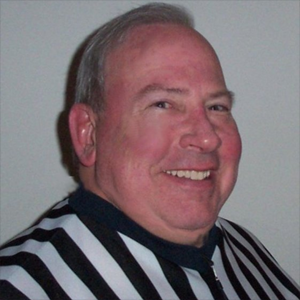
Rndballref
20 Years Experience
Chicago, IL
Male, 60
For twenty years I officiated high school, AAU and park district basketball games, retiring recently. For a few officiating is the focus of their occupation, while for most working as an umpire or basketball referee is an avocation. I started ref'ing to earn beer money during college, but it became a great way to stay connected to the best sports game in the universe. As a spinoff, I wrote a sports-thriller novel loosely based on my referee experiences titled, Advantage Disadvantage
I do not have any special knowledge of AAU league or tournament rules. I do know that age verification is a perpetual problem in traveling basketball.
It is subject to your interpretation.
On a spot throw-in, a player must stay within a 3 foot area along the out of bounds boundary. That three foot area extends from the out of bounds line all the way back to the wall, or the first obstruction (bleachers, table, etc.).
So to answer your question, as long as the player does not step in bounds before releasing the ball, he can take as many steps forward short of breaching the out bounds line.
Yes, in a tie game I called travelling on a last second shot which went in. I sent the game into overtime and the team that travelled lost the game.
Hospice Nurse
 How did you feel with the passing of your first patient?
How did you feel with the passing of your first patient?
Toymaker
 With all the high-tech kids toys, is there still a demand for traditional ones?
With all the high-tech kids toys, is there still a demand for traditional ones?
CBP Officer
 How cooperative are Mexican authorities re: US immigration and border control?
How cooperative are Mexican authorities re: US immigration and border control?
One principle is that you cannot travel between dribbles. Iverson probably travels (high school rules) when he jumps forward BEFORE he dribbles, a move Michael Jordan used as well. Iverson also, like Jordan, carries the ball (a NFHS violation) in the video several times but this seems to be allowed by the NBA.
A1 can dribble pass or shoot because B1 knocked the ball away and A1 no longer had player possession.
It is not traveling if a hand touches the floor as long as your feet have not violated the traveling rules. Any other part of your body (beside hands and feet) touching the floor while in control of the ball constitutes traveling.
-OR-
 Login with Facebook
Login with Facebook (max 20 characters - letters, numbers, and underscores only. Note that your username is private, and you have the option to choose an alias when asking questions or hosting a Q&A.)
(A valid e-mail address is required. Your e-mail will not be shared with anyone.)
(min 5 characters)
By checking this box, you acknowledge that you have read and agree to Jobstr.com’s Terms and Privacy Policy.
-OR-
 Register with Facebook
Register with Facebook(Don't worry: you'll be able to choose an alias when asking questions or hosting a Q&A.)